Performance Evaluation of DeGrandis Sporting Goods Projects
VerifiedAdded on 2023/06/03
|19
|1539
|367
AI Summary
This presentation evaluates the performance of DeGrandis Sporting Goods projects including their strategic goals, ethical standards, and PPS snapshot. It provides recommendations for enhancing product sales, monitoring quality, and mitigating customer dissatisfaction.
Contribute Materials
Your contribution can guide someone’s learning journey. Share your
documents today.
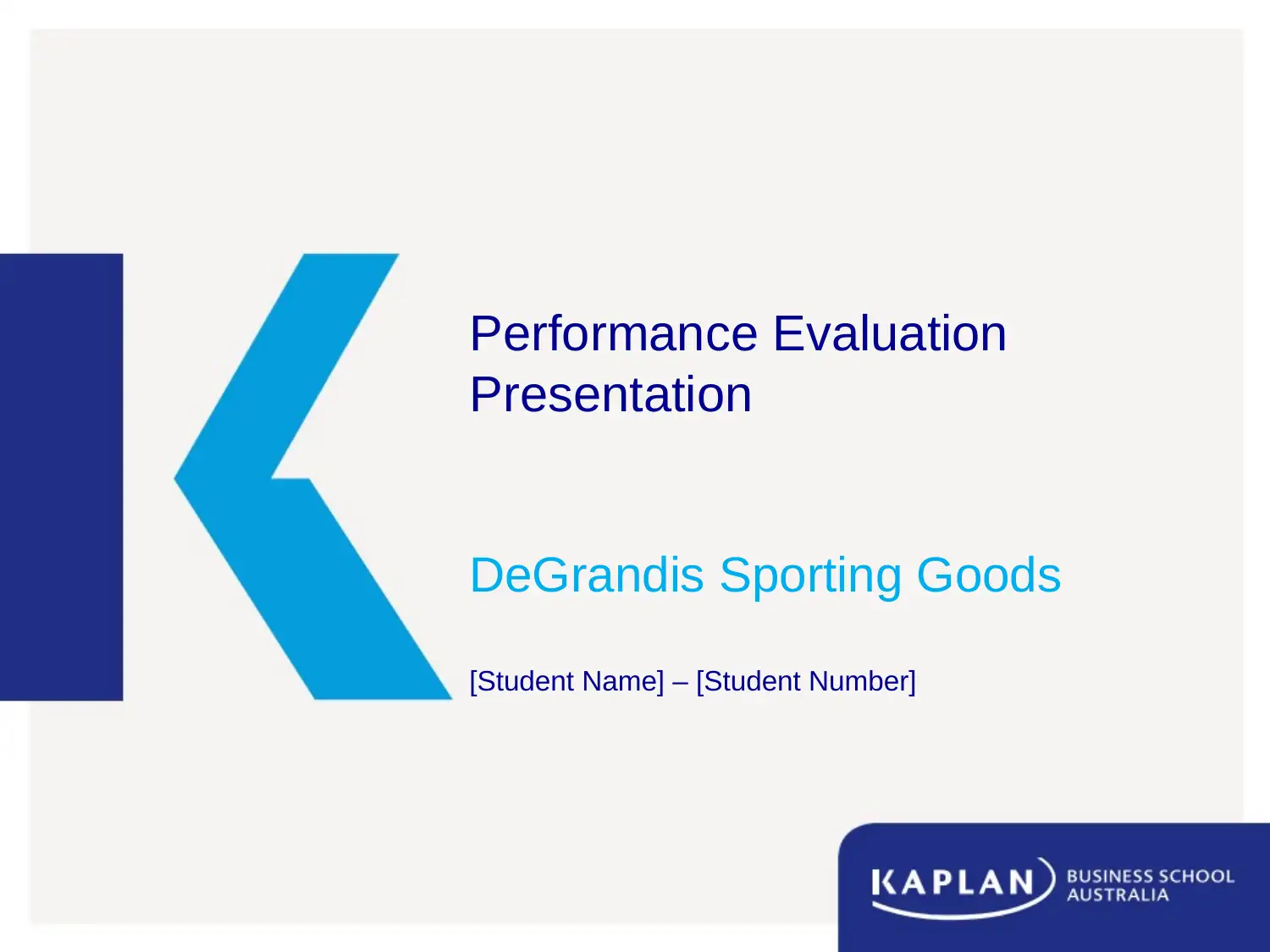
Performance Evaluation
Presentation
DeGrandis Sporting Goods
[Student Name] – [Student Number]
Presentation
DeGrandis Sporting Goods
[Student Name] – [Student Number]
Secure Best Marks with AI Grader
Need help grading? Try our AI Grader for instant feedback on your assignments.
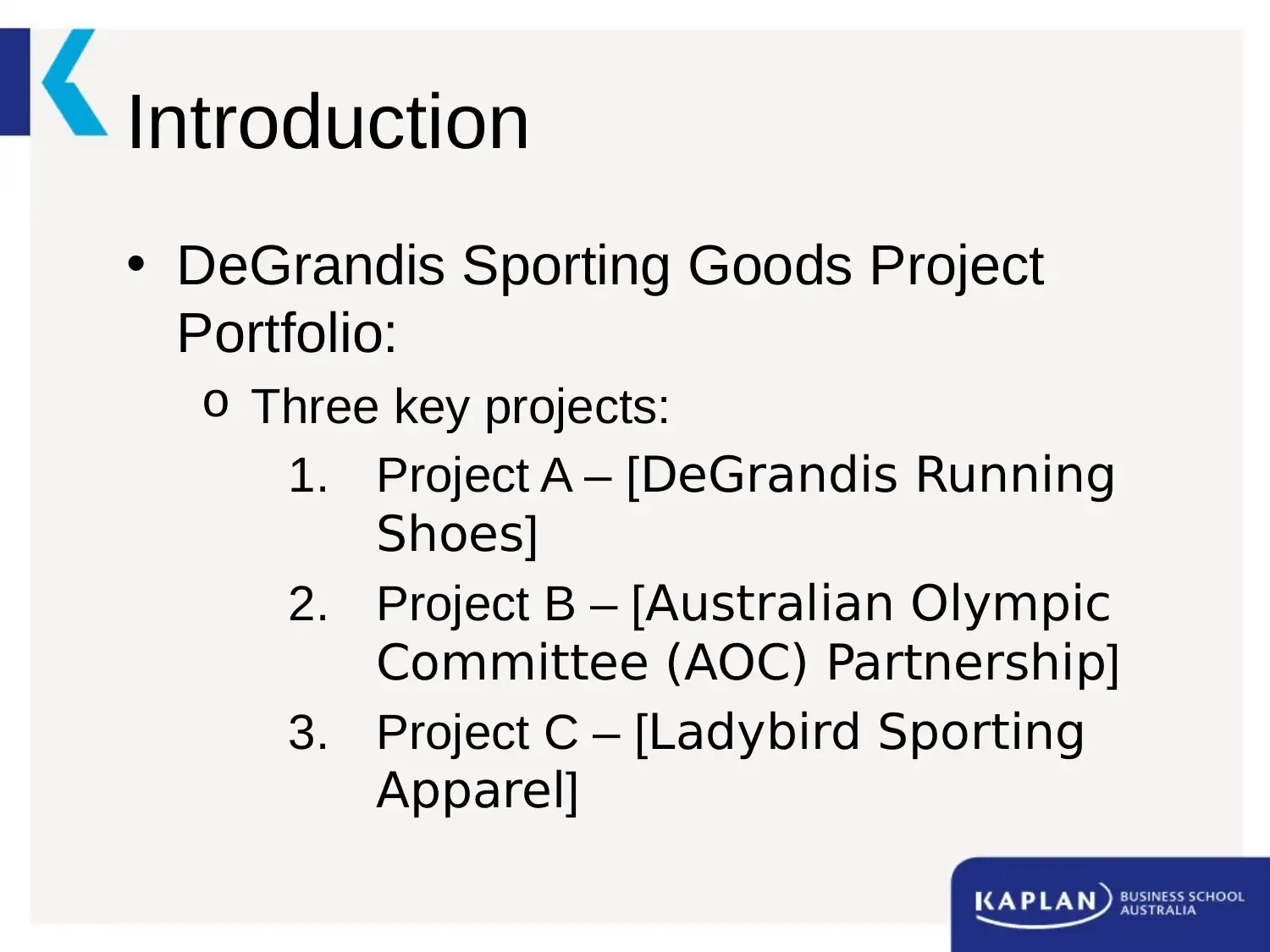
Introduction
• DeGrandis Sporting Goods Project
Portfolio:
o Three key projects:
1. Project A – [DeGrandis Running
Shoes]
2. Project B – [Australian Olympic
Committee (AOC) Partnership]
3. Project C – [Ladybird Sporting
Apparel]
• DeGrandis Sporting Goods Project
Portfolio:
o Three key projects:
1. Project A – [DeGrandis Running
Shoes]
2. Project B – [Australian Olympic
Committee (AOC) Partnership]
3. Project C – [Ladybird Sporting
Apparel]
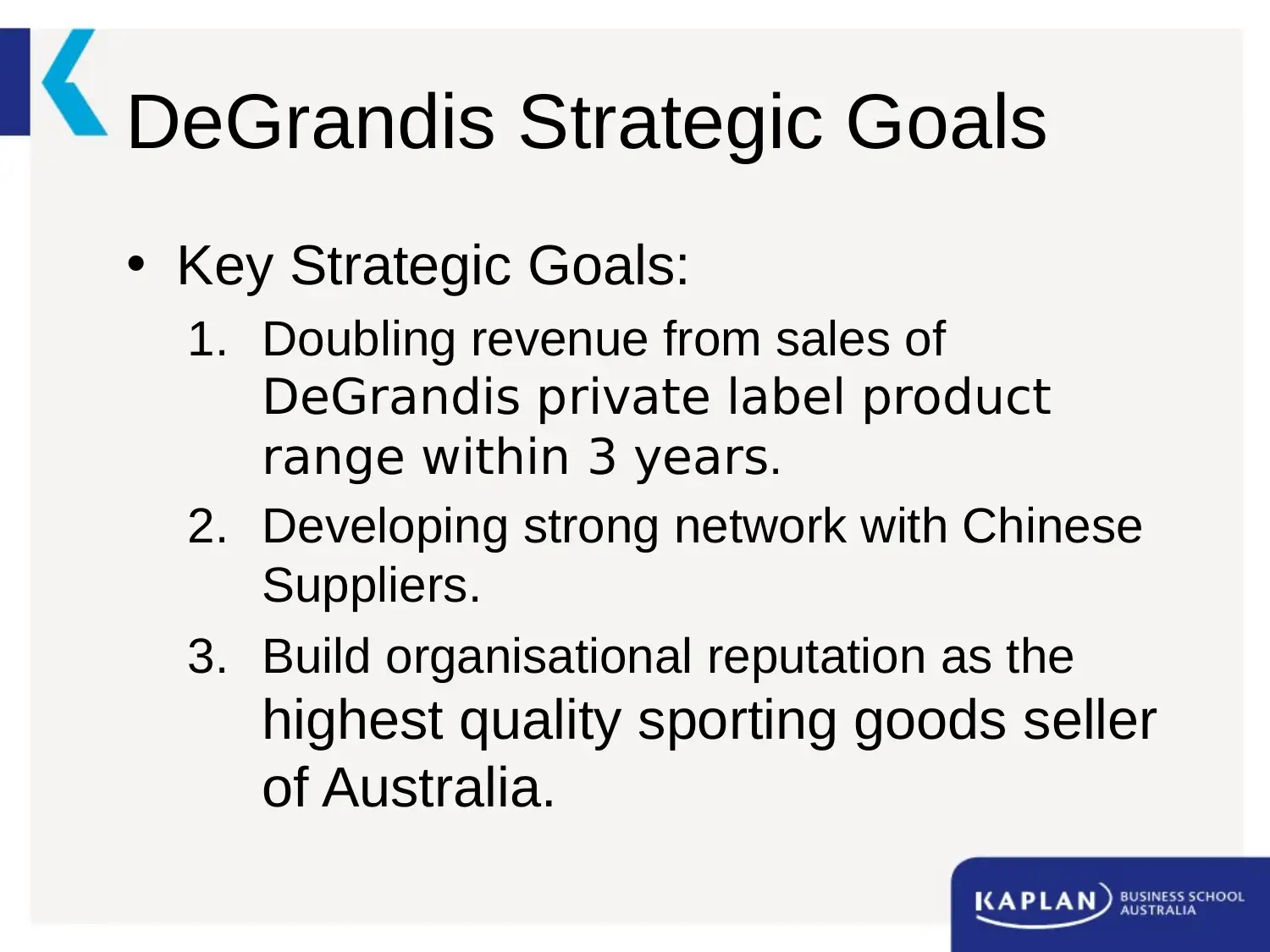
DeGrandis Strategic Goals
• Key Strategic Goals:
1. Doubling revenue from sales of
DeGrandis private label product
range within 3 years.
2. Developing strong network with Chinese
Suppliers.
3. Build organisational reputation as the
highest quality sporting goods seller
of Australia.
• Key Strategic Goals:
1. Doubling revenue from sales of
DeGrandis private label product
range within 3 years.
2. Developing strong network with Chinese
Suppliers.
3. Build organisational reputation as the
highest quality sporting goods seller
of Australia.
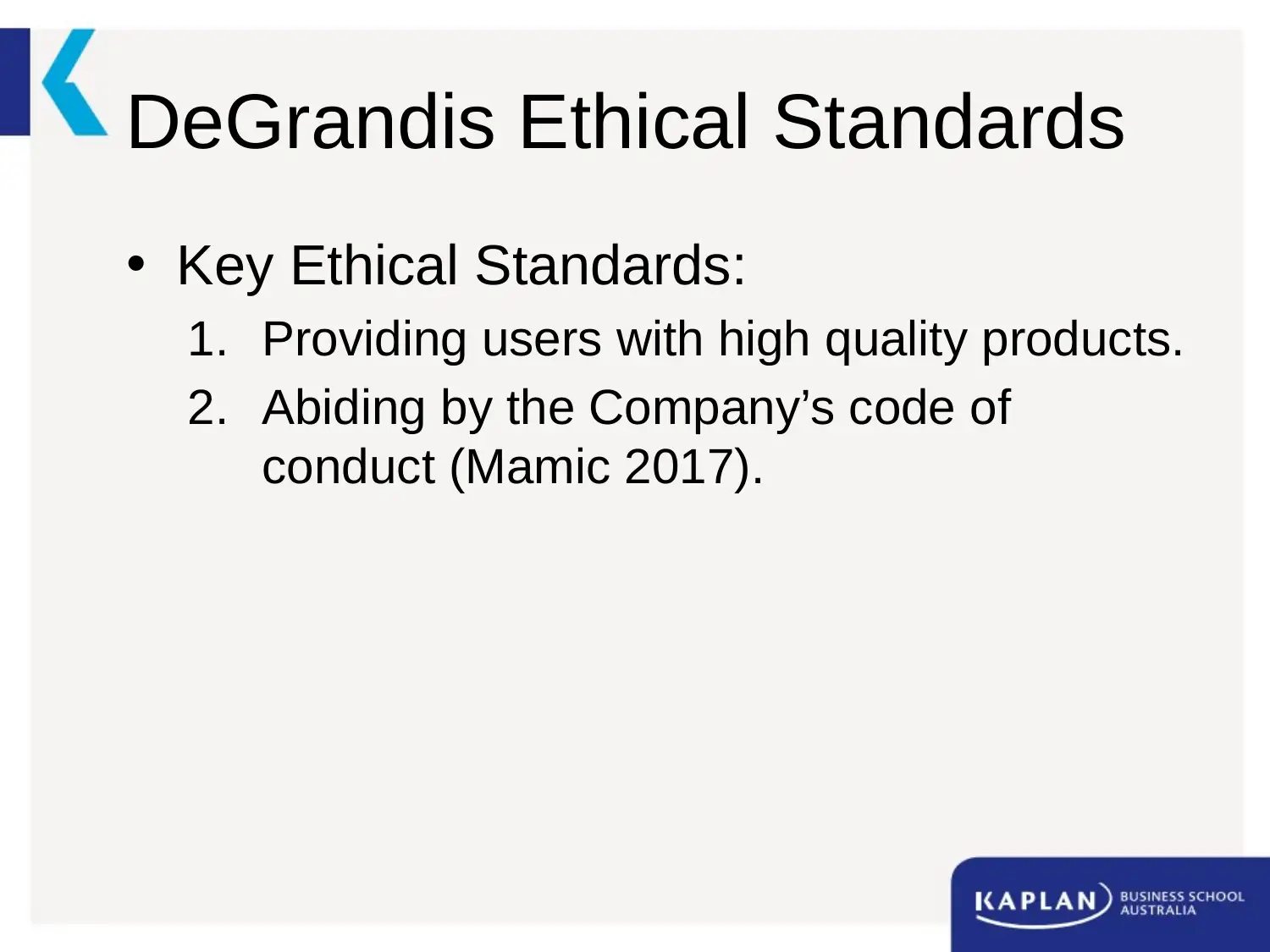
DeGrandis Ethical Standards
• Key Ethical Standards:
1. Providing users with high quality products.
2. Abiding by the Company’s code of
conduct (Mamic 2017).
• Key Ethical Standards:
1. Providing users with high quality products.
2. Abiding by the Company’s code of
conduct (Mamic 2017).
Secure Best Marks with AI Grader
Need help grading? Try our AI Grader for instant feedback on your assignments.
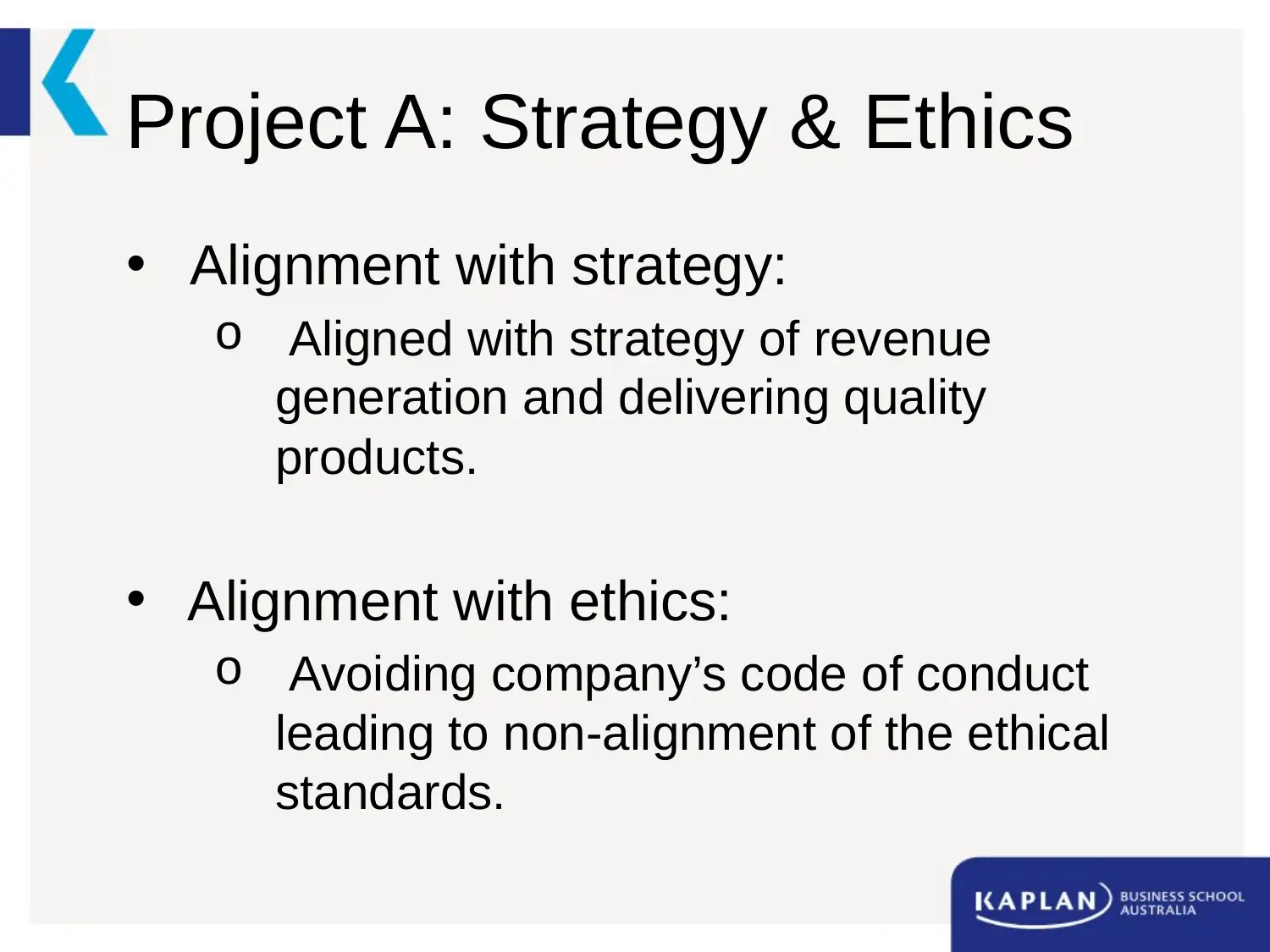
Project A: Strategy & Ethics
• Alignment with strategy:
o Aligned with strategy of revenue
generation and delivering quality
products.
• Alignment with ethics:
o Avoiding company’s code of conduct
leading to non-alignment of the ethical
standards.
• Alignment with strategy:
o Aligned with strategy of revenue
generation and delivering quality
products.
• Alignment with ethics:
o Avoiding company’s code of conduct
leading to non-alignment of the ethical
standards.
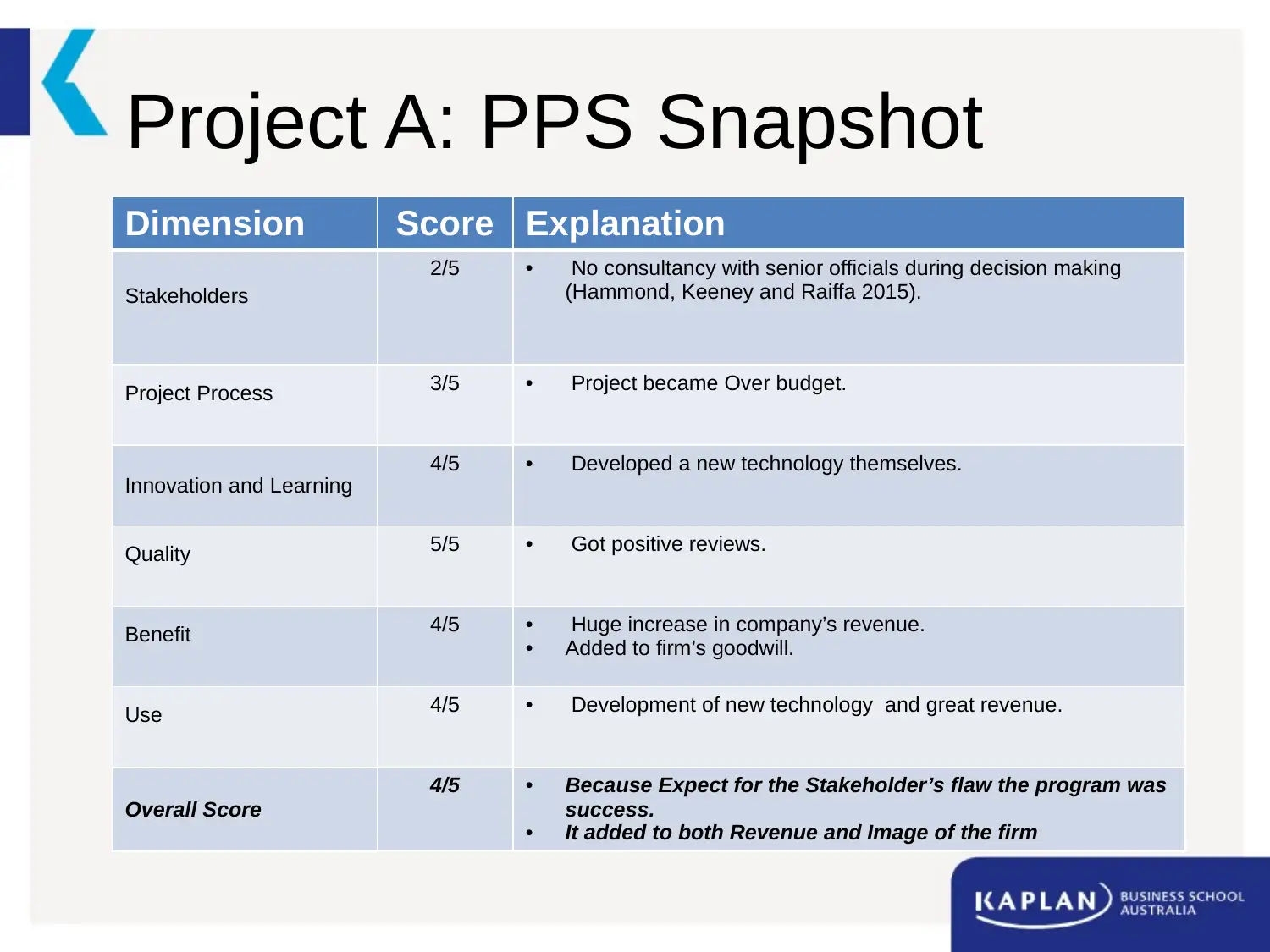
Project A: PPS Snapshot
Dimension Score Explanation
Stakeholders
2/5 • No consultancy with senior officials during decision making
(Hammond, Keeney and Raiffa 2015).
Project Process 3/5 • Project became Over budget.
Innovation and Learning
4/5 • Developed a new technology themselves.
Quality 5/5 • Got positive reviews.
Benefit 4/5 • Huge increase in company’s revenue.
• Added to firm’s goodwill.
Use 4/5 • Development of new technology and great revenue.
Overall Score
4/5 • Because Expect for the Stakeholder’s flaw the program was
success.
• It added to both Revenue and Image of the firm
Dimension Score Explanation
Stakeholders
2/5 • No consultancy with senior officials during decision making
(Hammond, Keeney and Raiffa 2015).
Project Process 3/5 • Project became Over budget.
Innovation and Learning
4/5 • Developed a new technology themselves.
Quality 5/5 • Got positive reviews.
Benefit 4/5 • Huge increase in company’s revenue.
• Added to firm’s goodwill.
Use 4/5 • Development of new technology and great revenue.
Overall Score
4/5 • Because Expect for the Stakeholder’s flaw the program was
success.
• It added to both Revenue and Image of the firm
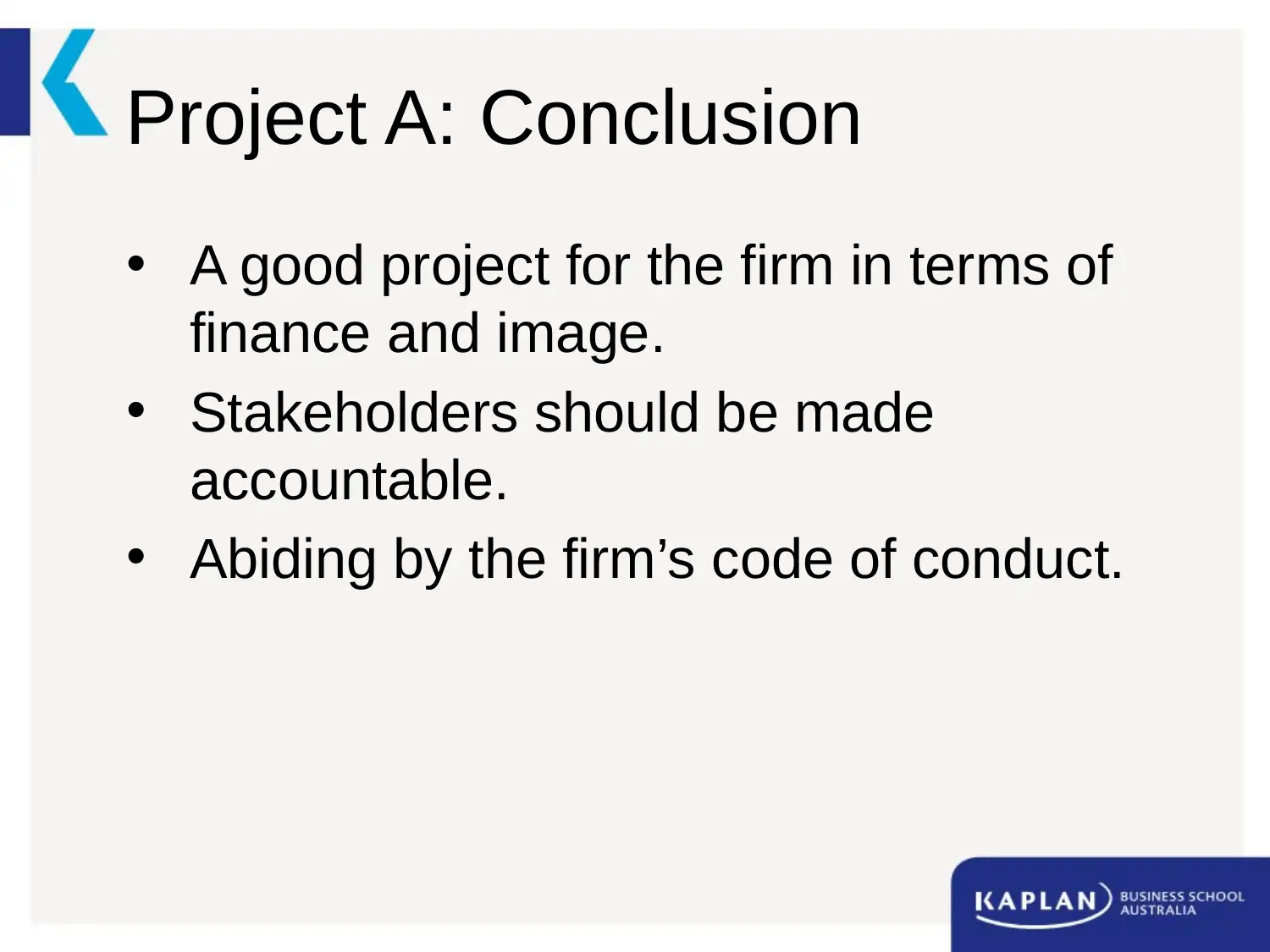
Project A: Conclusion
• A good project for the firm in terms of
finance and image.
• Stakeholders should be made
accountable.
• Abiding by the firm’s code of conduct.
• A good project for the firm in terms of
finance and image.
• Stakeholders should be made
accountable.
• Abiding by the firm’s code of conduct.
Paraphrase This Document
Need a fresh take? Get an instant paraphrase of this document with our AI Paraphraser
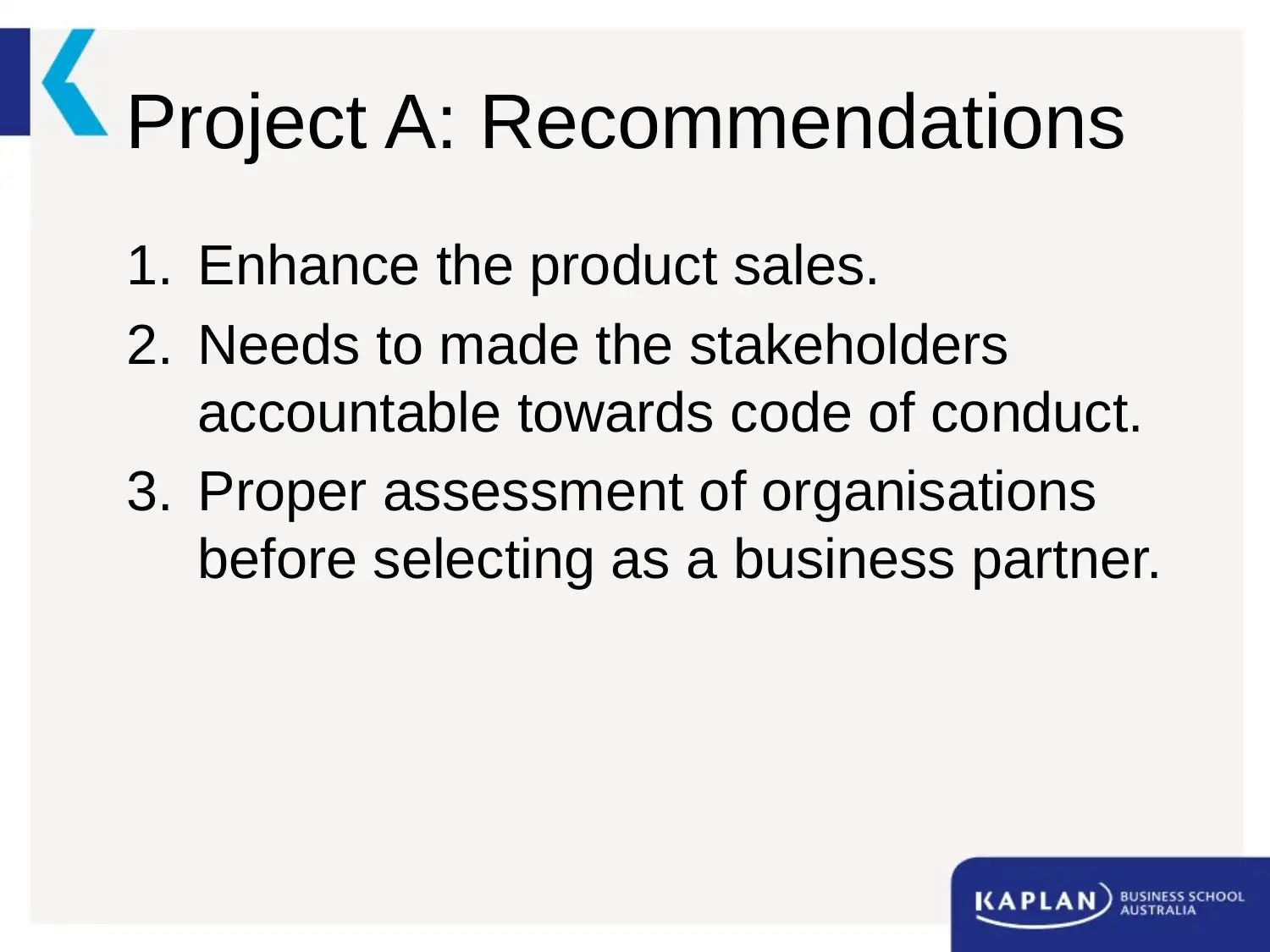
Project A: Recommendations
1. Enhance the product sales.
2. Needs to made the stakeholders
accountable towards code of conduct.
3. Proper assessment of organisations
before selecting as a business partner.
1. Enhance the product sales.
2. Needs to made the stakeholders
accountable towards code of conduct.
3. Proper assessment of organisations
before selecting as a business partner.
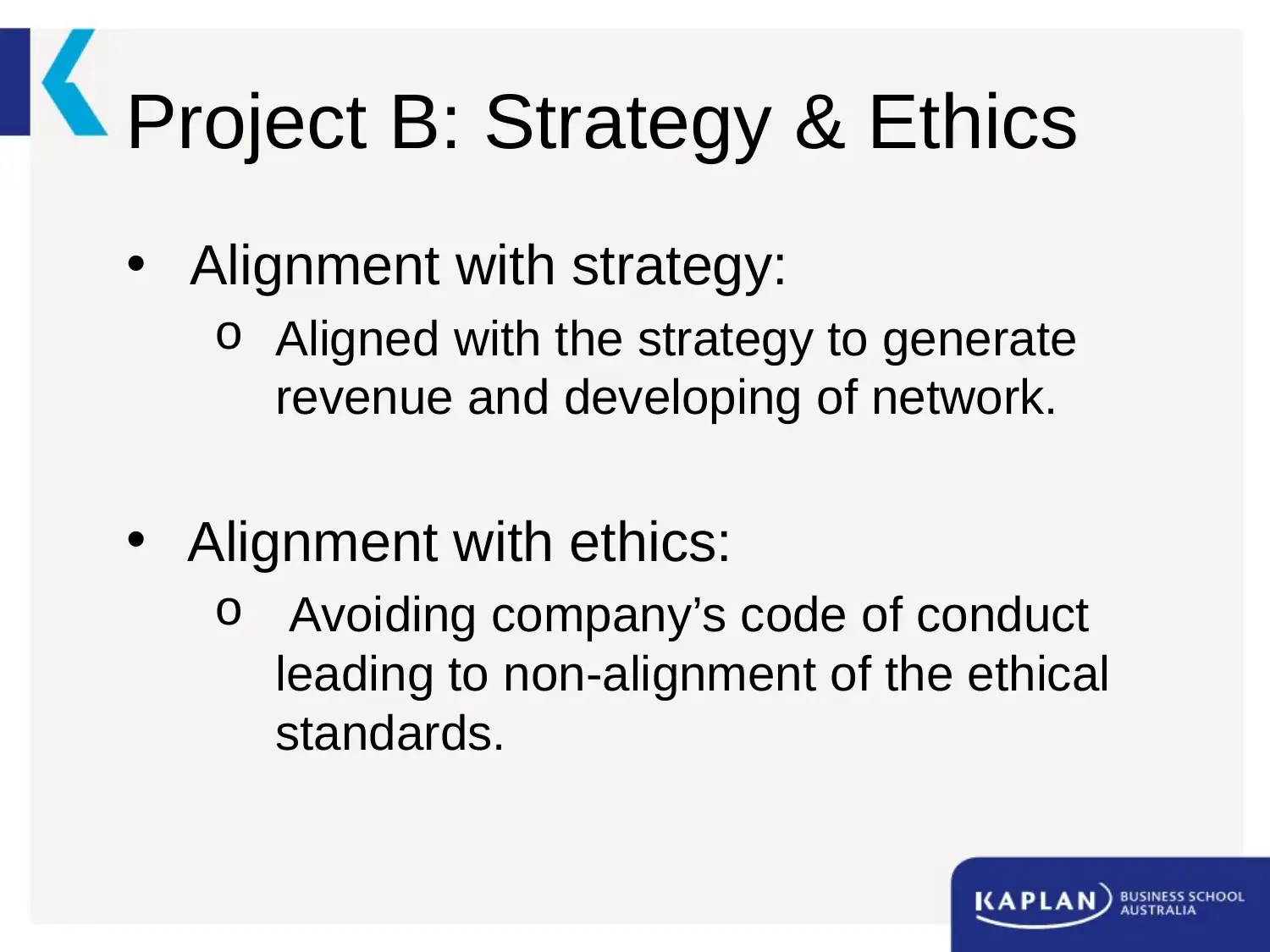
Project B: Strategy & Ethics
• Alignment with strategy:
o Aligned with the strategy to generate
revenue and developing of network.
• Alignment with ethics:
o Avoiding company’s code of conduct
leading to non-alignment of the ethical
standards.
• Alignment with strategy:
o Aligned with the strategy to generate
revenue and developing of network.
• Alignment with ethics:
o Avoiding company’s code of conduct
leading to non-alignment of the ethical
standards.
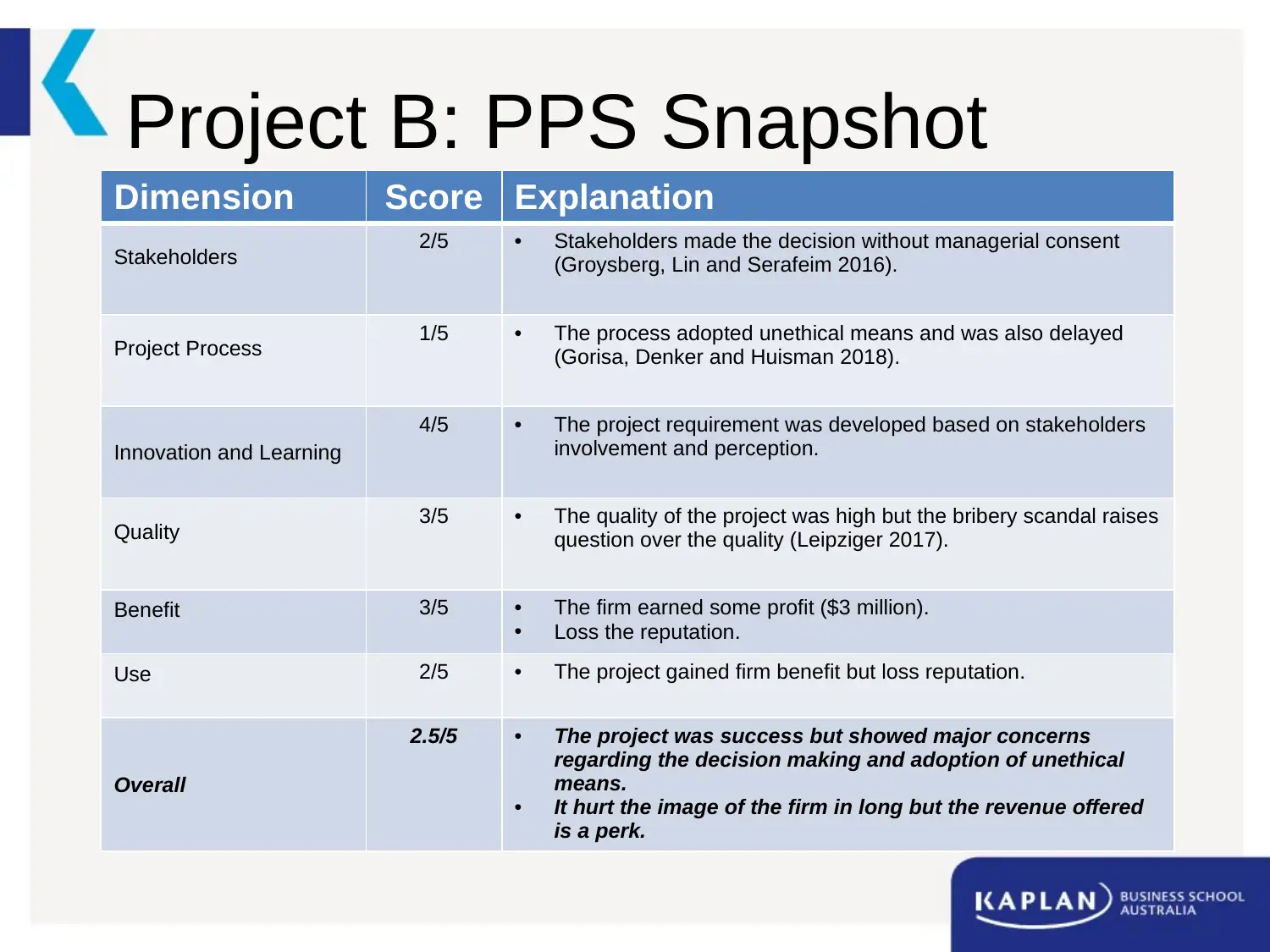
Project B: PPS Snapshot
Dimension Score Explanation
Stakeholders 2/5 • Stakeholders made the decision without managerial consent
(Groysberg, Lin and Serafeim 2016).
Project Process 1/5 • The process adopted unethical means and was also delayed
(Gorisa, Denker and Huisman 2018).
Innovation and Learning
4/5 • The project requirement was developed based on stakeholders
involvement and perception.
Quality 3/5 • The quality of the project was high but the bribery scandal raises
question over the quality (Leipziger 2017).
Benefit 3/5 • The firm earned some profit ($3 million).
• Loss the reputation.
Use 2/5 • The project gained firm benefit but loss reputation.
Overall
2.5/5 • The project was success but showed major concerns
regarding the decision making and adoption of unethical
means.
• It hurt the image of the firm in long but the revenue offered
is a perk.
Dimension Score Explanation
Stakeholders 2/5 • Stakeholders made the decision without managerial consent
(Groysberg, Lin and Serafeim 2016).
Project Process 1/5 • The process adopted unethical means and was also delayed
(Gorisa, Denker and Huisman 2018).
Innovation and Learning
4/5 • The project requirement was developed based on stakeholders
involvement and perception.
Quality 3/5 • The quality of the project was high but the bribery scandal raises
question over the quality (Leipziger 2017).
Benefit 3/5 • The firm earned some profit ($3 million).
• Loss the reputation.
Use 2/5 • The project gained firm benefit but loss reputation.
Overall
2.5/5 • The project was success but showed major concerns
regarding the decision making and adoption of unethical
means.
• It hurt the image of the firm in long but the revenue offered
is a perk.
Secure Best Marks with AI Grader
Need help grading? Try our AI Grader for instant feedback on your assignments.
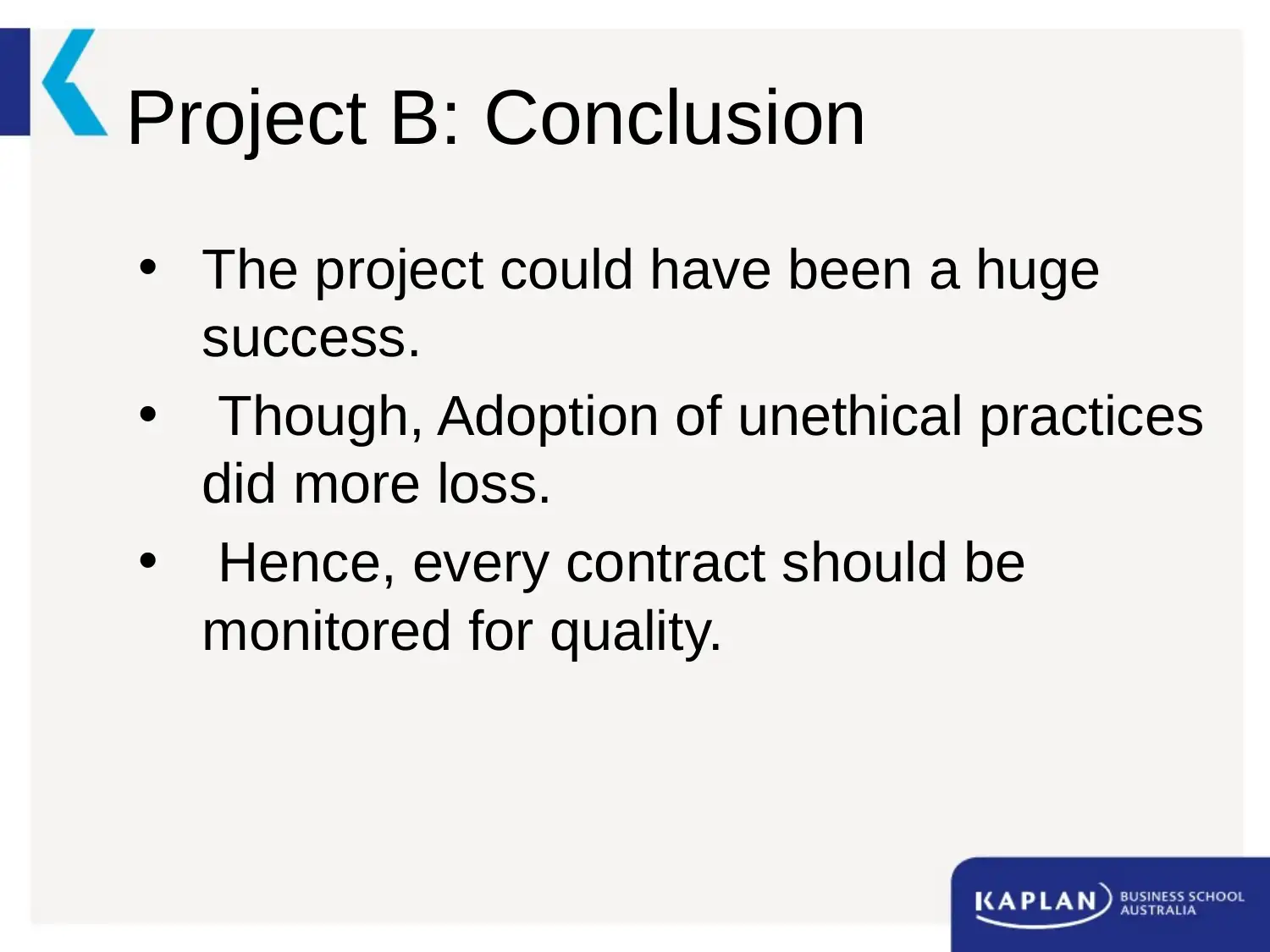
Project B: Conclusion
• The project could have been a huge
success.
• Though, Adoption of unethical practices
did more loss.
• Hence, every contract should be
monitored for quality.
• The project could have been a huge
success.
• Though, Adoption of unethical practices
did more loss.
• Hence, every contract should be
monitored for quality.
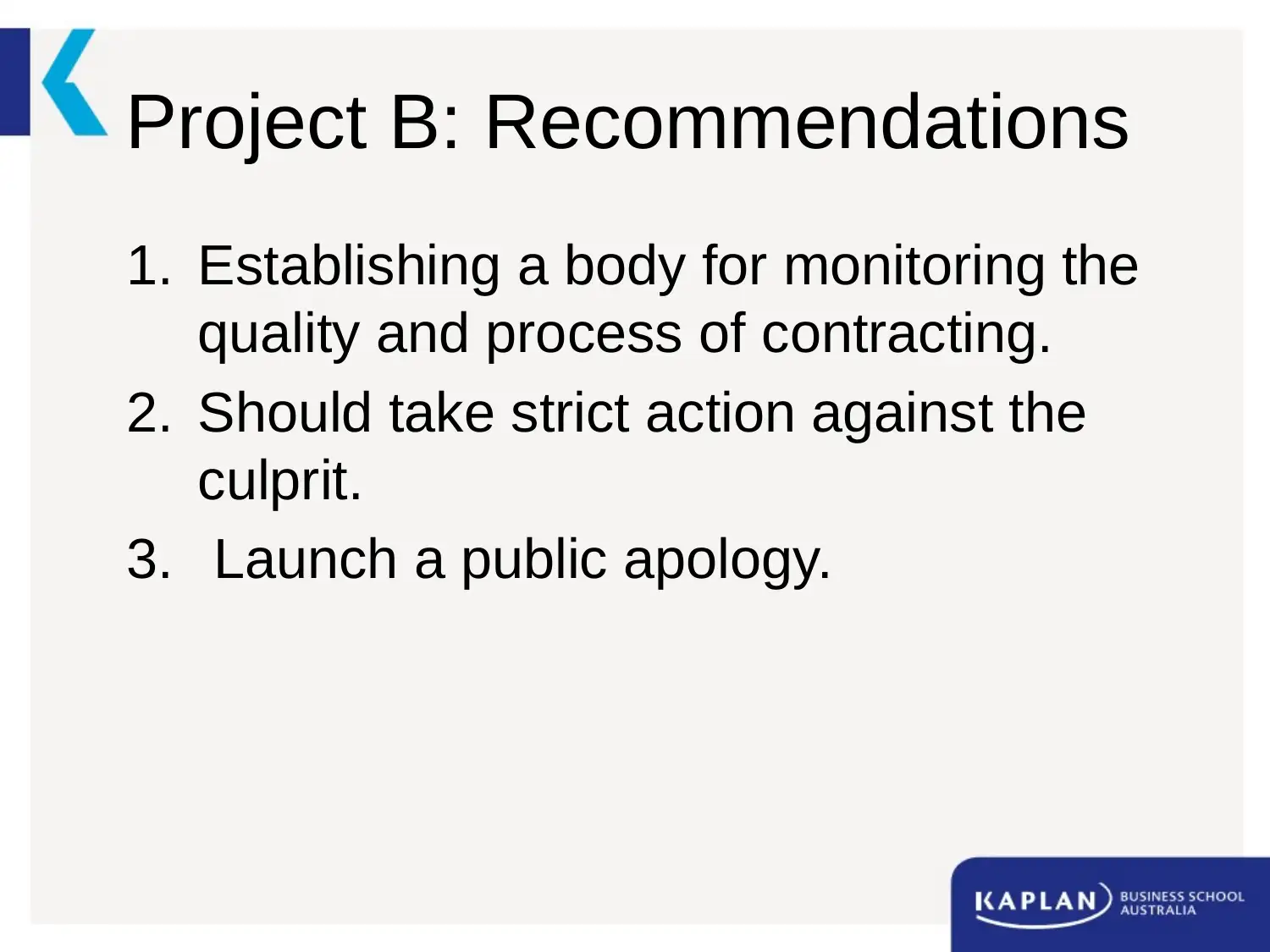
Project B: Recommendations
1. Establishing a body for monitoring the
quality and process of contracting.
2. Should take strict action against the
culprit.
3. Launch a public apology.
1. Establishing a body for monitoring the
quality and process of contracting.
2. Should take strict action against the
culprit.
3. Launch a public apology.
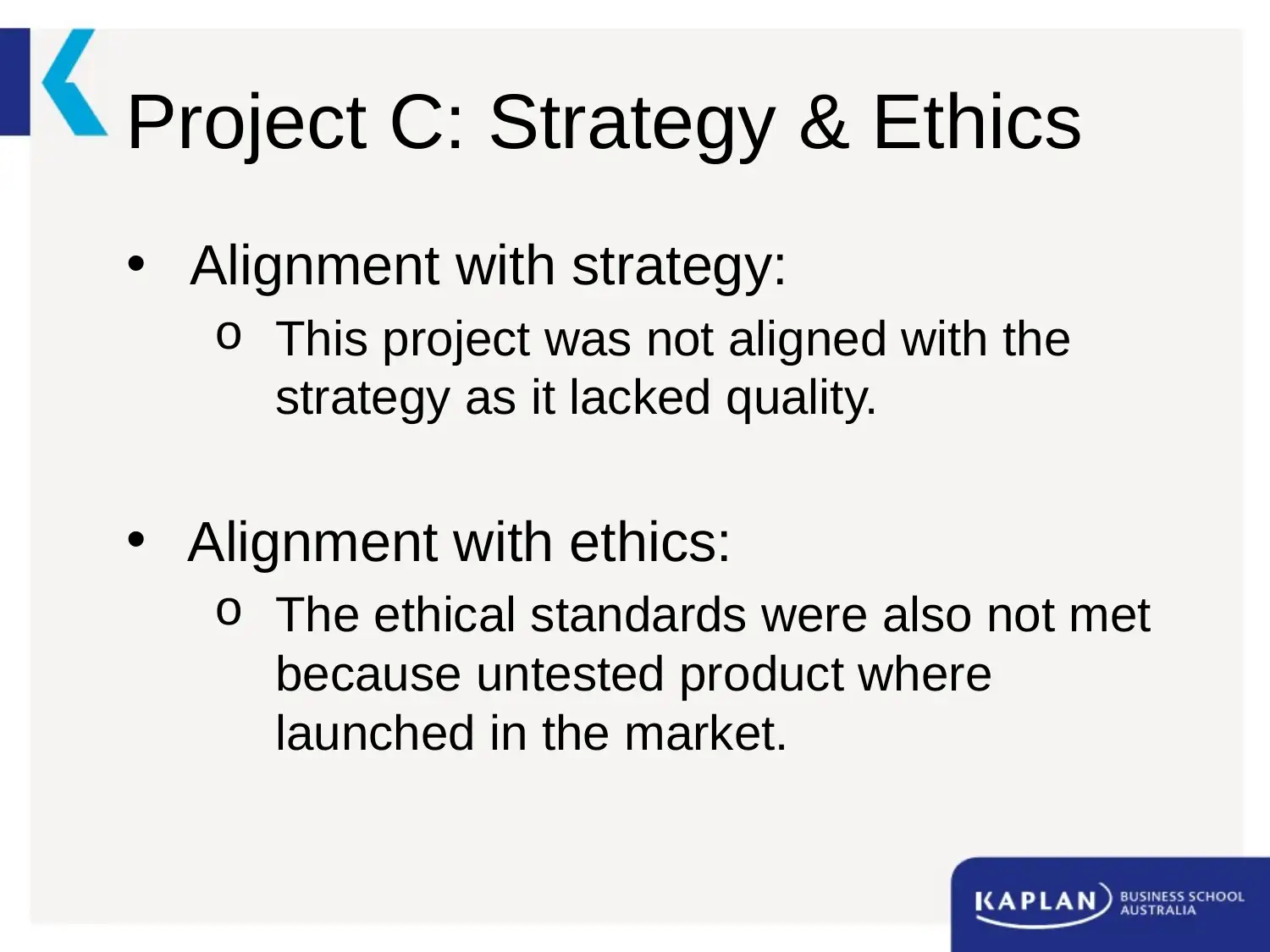
Project C: Strategy & Ethics
• Alignment with strategy:
o This project was not aligned with the
strategy as it lacked quality.
• Alignment with ethics:
o The ethical standards were also not met
because untested product where
launched in the market.
• Alignment with strategy:
o This project was not aligned with the
strategy as it lacked quality.
• Alignment with ethics:
o The ethical standards were also not met
because untested product where
launched in the market.
Paraphrase This Document
Need a fresh take? Get an instant paraphrase of this document with our AI Paraphraser
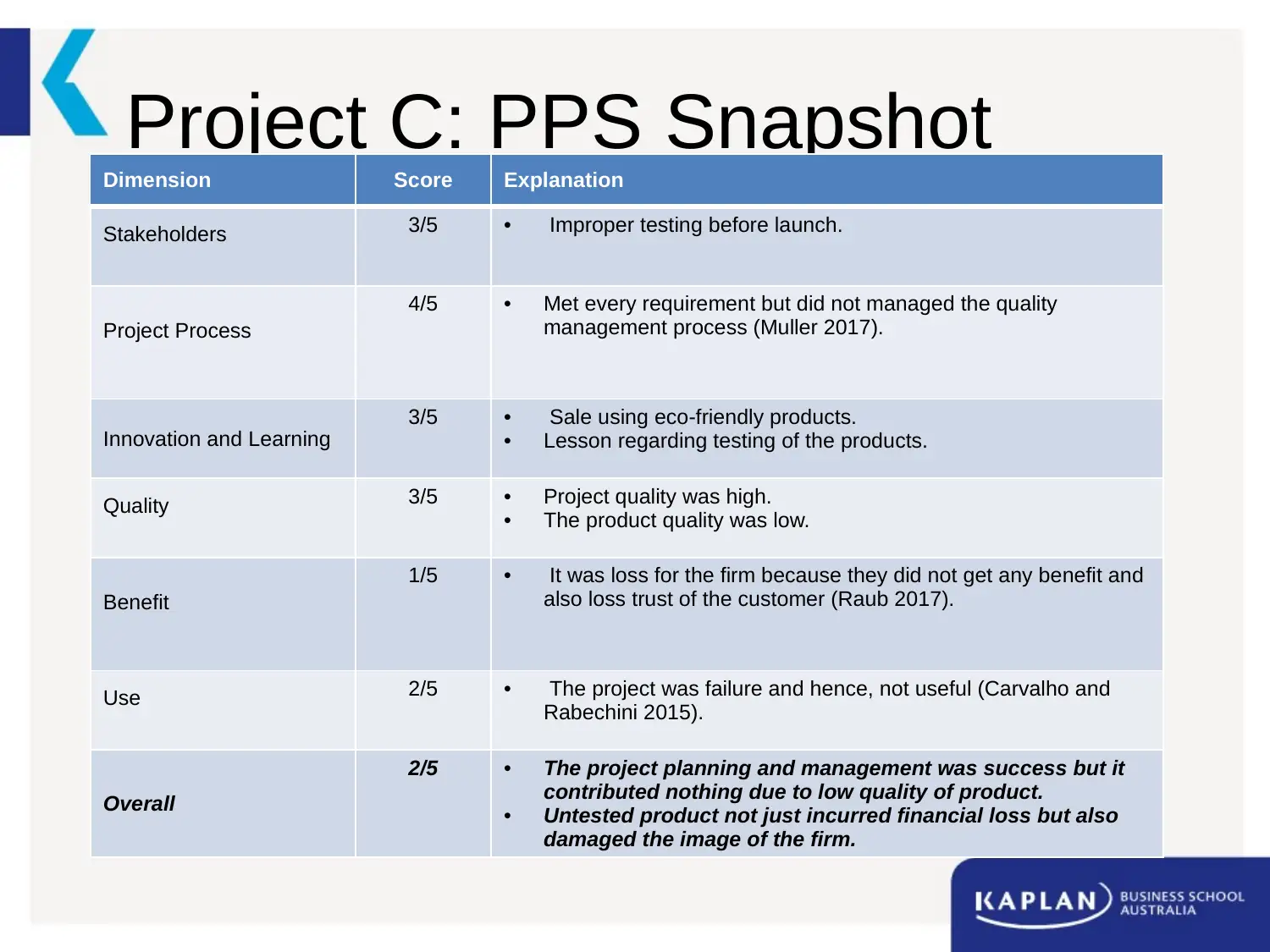
Project C: PPS Snapshot
Dimension Score Explanation
Stakeholders 3/5 • Improper testing before launch.
Project Process
4/5 • Met every requirement but did not managed the quality
management process (Muller 2017).
Innovation and Learning
3/5 • Sale using eco-friendly products.
• Lesson regarding testing of the products.
Quality 3/5 • Project quality was high.
• The product quality was low.
Benefit
1/5 • It was loss for the firm because they did not get any benefit and
also loss trust of the customer (Raub 2017).
Use 2/5 • The project was failure and hence, not useful (Carvalho and
Rabechini 2015).
Overall
2/5 • The project planning and management was success but it
contributed nothing due to low quality of product.
• Untested product not just incurred financial loss but also
damaged the image of the firm.
Dimension Score Explanation
Stakeholders 3/5 • Improper testing before launch.
Project Process
4/5 • Met every requirement but did not managed the quality
management process (Muller 2017).
Innovation and Learning
3/5 • Sale using eco-friendly products.
• Lesson regarding testing of the products.
Quality 3/5 • Project quality was high.
• The product quality was low.
Benefit
1/5 • It was loss for the firm because they did not get any benefit and
also loss trust of the customer (Raub 2017).
Use 2/5 • The project was failure and hence, not useful (Carvalho and
Rabechini 2015).
Overall
2/5 • The project planning and management was success but it
contributed nothing due to low quality of product.
• Untested product not just incurred financial loss but also
damaged the image of the firm.
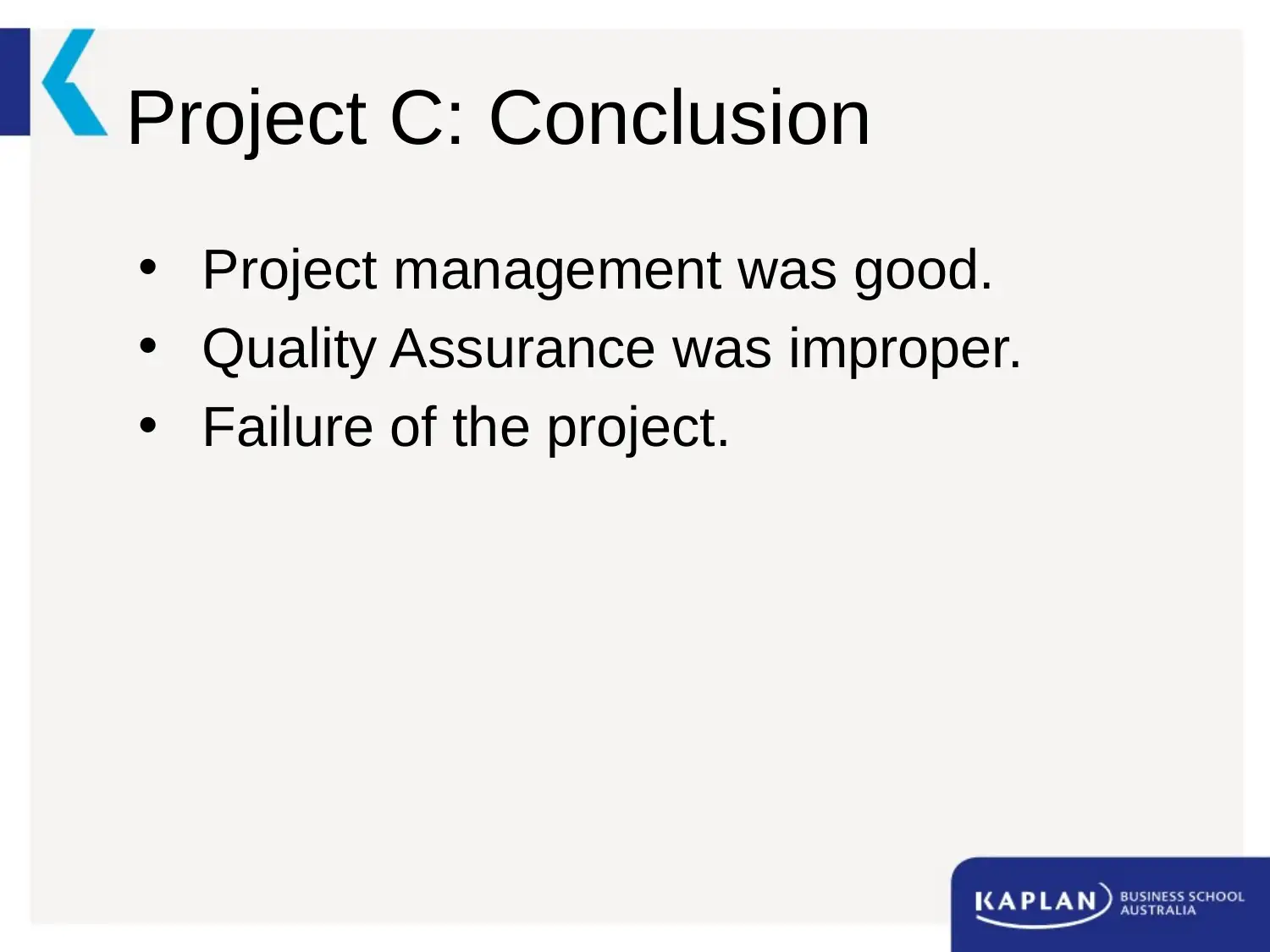
Project C: Conclusion
• Project management was good.
• Quality Assurance was improper.
• Failure of the project.
• Project management was good.
• Quality Assurance was improper.
• Failure of the project.
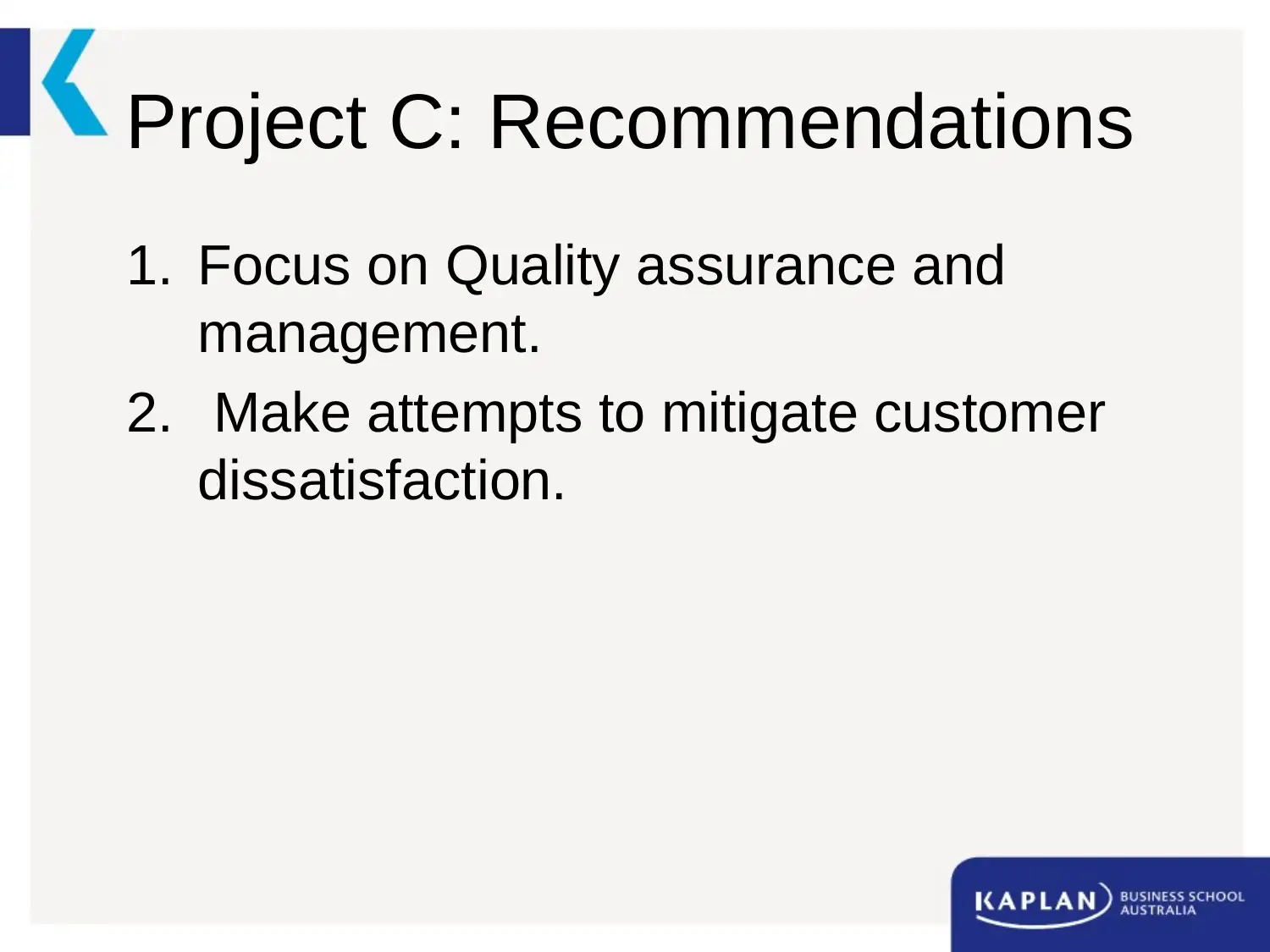
Project C: Recommendations
1. Focus on Quality assurance and
management.
2. Make attempts to mitigate customer
dissatisfaction.
1. Focus on Quality assurance and
management.
2. Make attempts to mitigate customer
dissatisfaction.
Secure Best Marks with AI Grader
Need help grading? Try our AI Grader for instant feedback on your assignments.
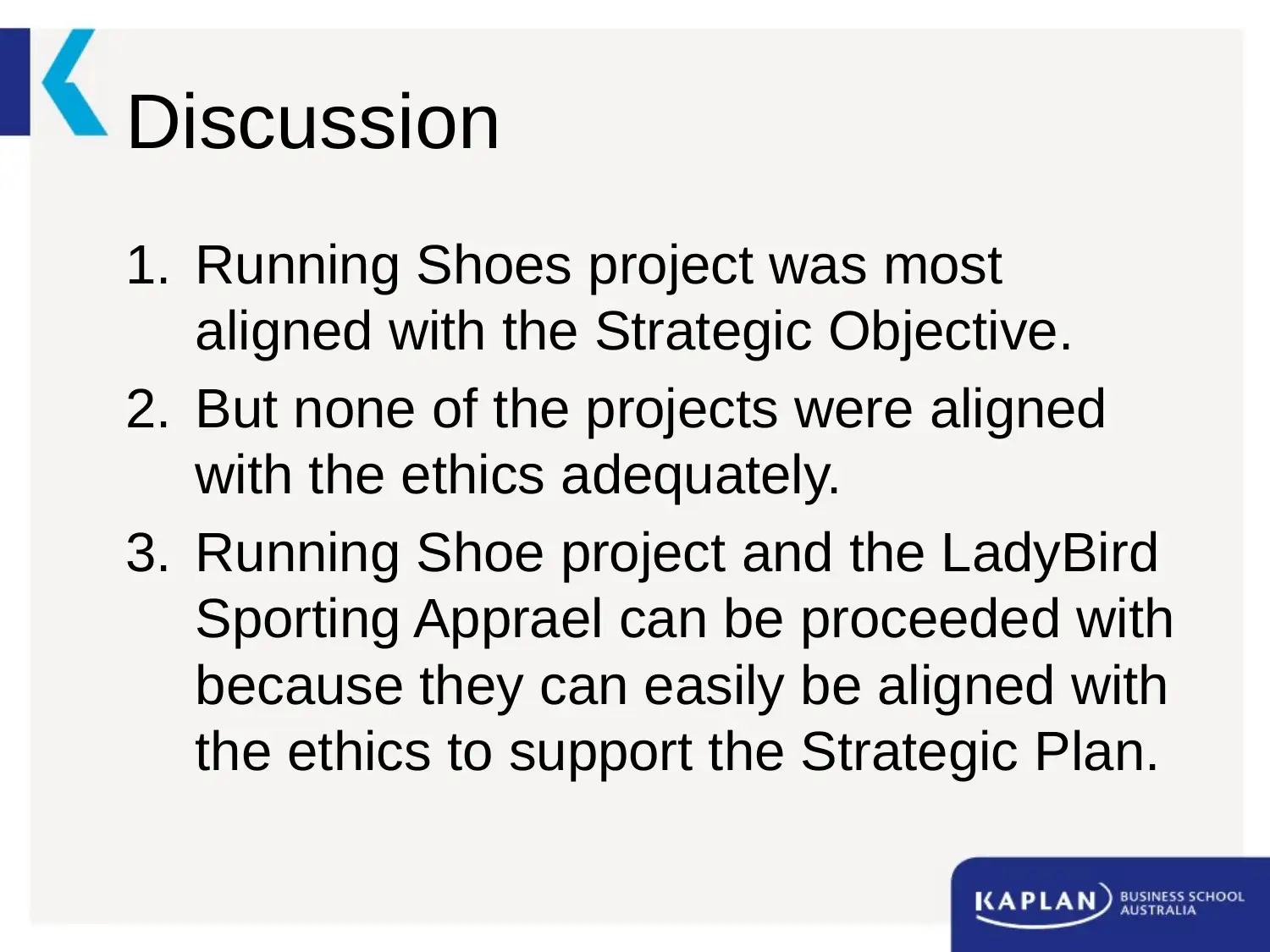
Discussion
1. Running Shoes project was most
aligned with the Strategic Objective.
2. But none of the projects were aligned
with the ethics adequately.
3. Running Shoe project and the LadyBird
Sporting Apprael can be proceeded with
because they can easily be aligned with
the ethics to support the Strategic Plan.
1. Running Shoes project was most
aligned with the Strategic Objective.
2. But none of the projects were aligned
with the ethics adequately.
3. Running Shoe project and the LadyBird
Sporting Apprael can be proceeded with
because they can easily be aligned with
the ethics to support the Strategic Plan.
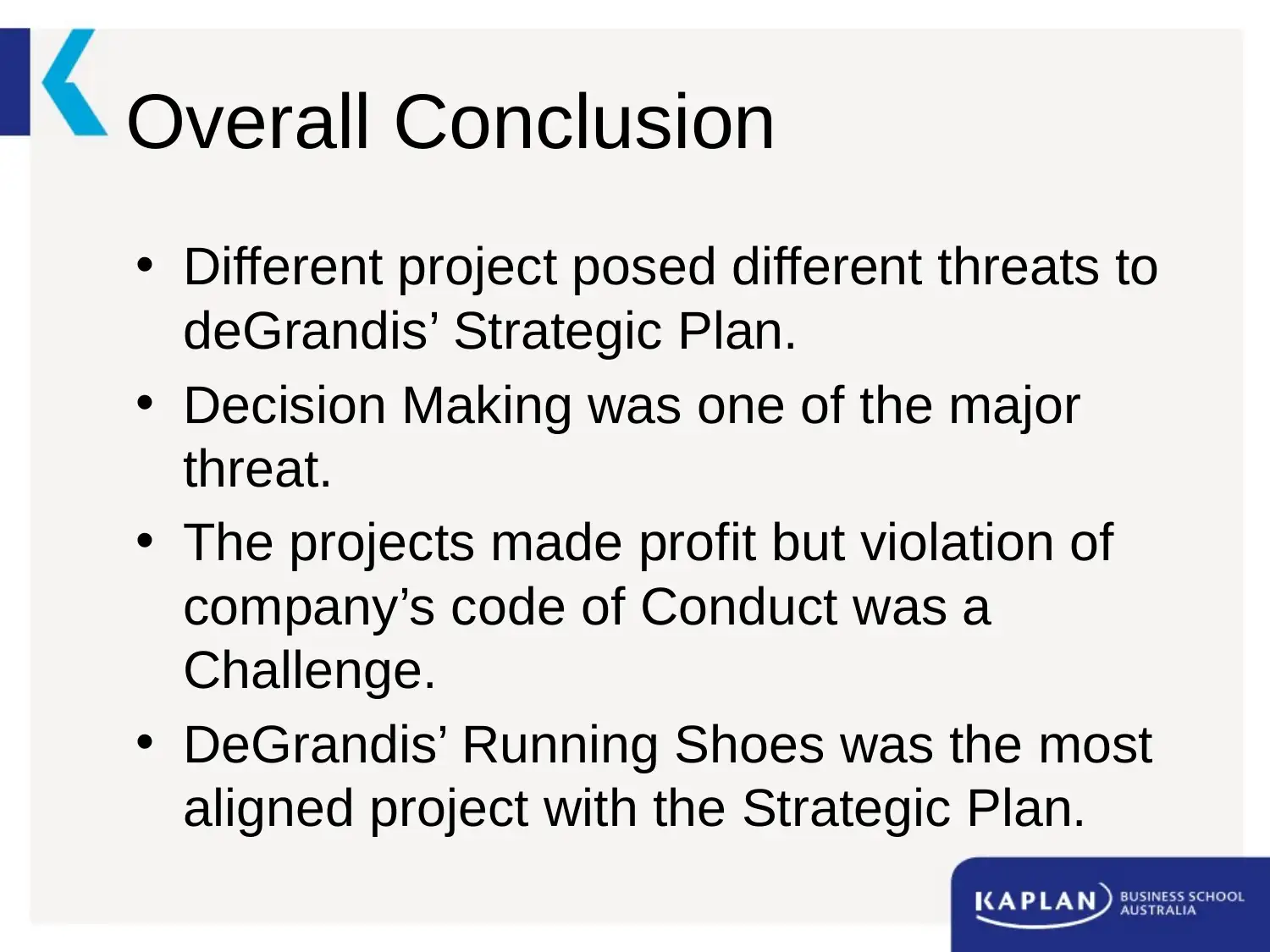
Overall Conclusion
• Different project posed different threats to
deGrandis’ Strategic Plan.
• Decision Making was one of the major
threat.
• The projects made profit but violation of
company’s code of Conduct was a
Challenge.
• DeGrandis’ Running Shoes was the most
aligned project with the Strategic Plan.
• Different project posed different threats to
deGrandis’ Strategic Plan.
• Decision Making was one of the major
threat.
• The projects made profit but violation of
company’s code of Conduct was a
Challenge.
• DeGrandis’ Running Shoes was the most
aligned project with the Strategic Plan.
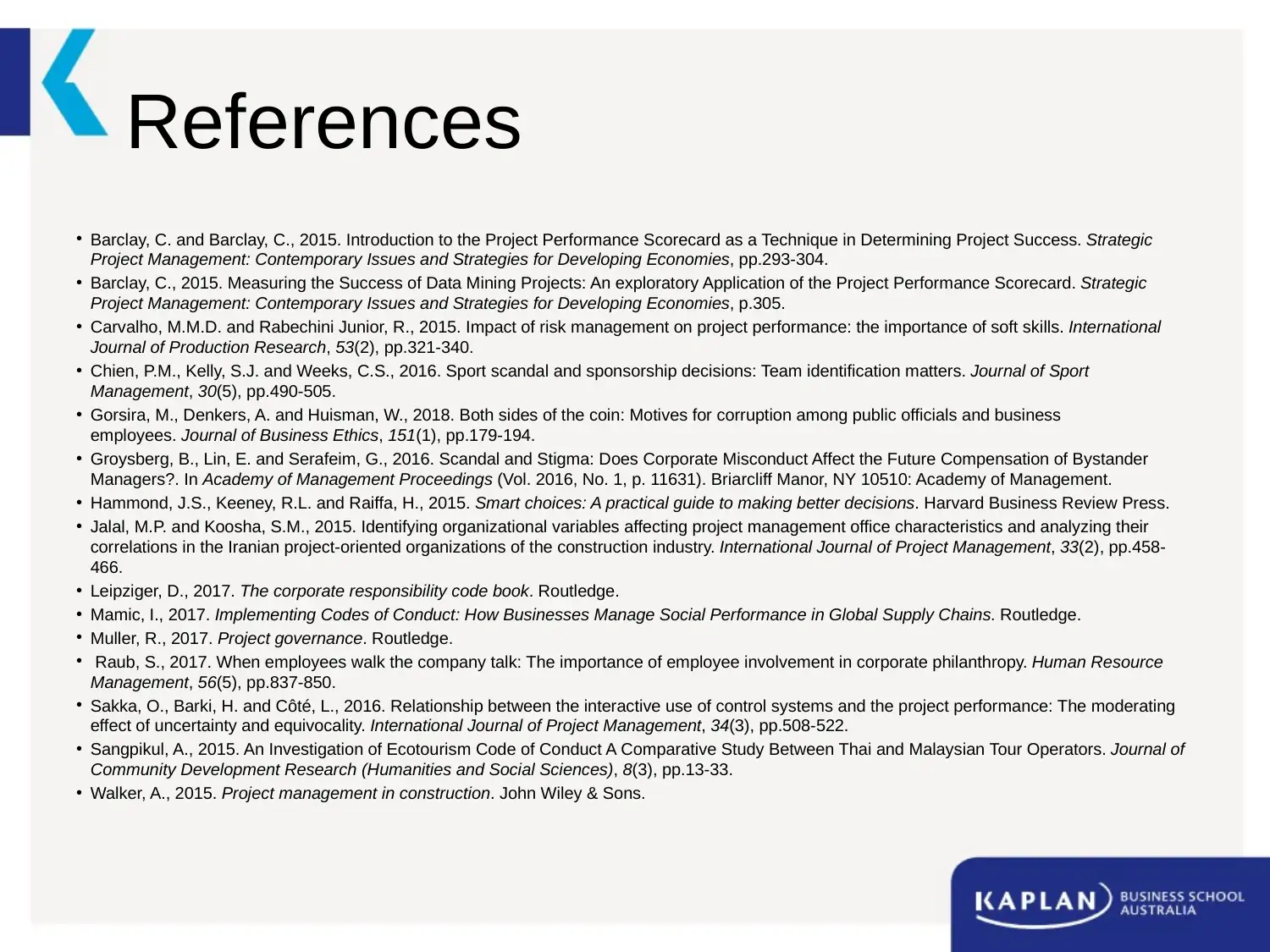
References
• Barclay, C. and Barclay, C., 2015. Introduction to the Project Performance Scorecard as a Technique in Determining Project Success. Strategic
Project Management: Contemporary Issues and Strategies for Developing Economies, pp.293-304.
• Barclay, C., 2015. Measuring the Success of Data Mining Projects: An exploratory Application of the Project Performance Scorecard. Strategic
Project Management: Contemporary Issues and Strategies for Developing Economies, p.305.
• Carvalho, M.M.D. and Rabechini Junior, R., 2015. Impact of risk management on project performance: the importance of soft skills. International
Journal of Production Research, 53(2), pp.321-340.
• Chien, P.M., Kelly, S.J. and Weeks, C.S., 2016. Sport scandal and sponsorship decisions: Team identification matters. Journal of Sport
Management, 30(5), pp.490-505.
• Gorsira, M., Denkers, A. and Huisman, W., 2018. Both sides of the coin: Motives for corruption among public officials and business
employees. Journal of Business Ethics, 151(1), pp.179-194.
• Groysberg, B., Lin, E. and Serafeim, G., 2016. Scandal and Stigma: Does Corporate Misconduct Affect the Future Compensation of Bystander
Managers?. In Academy of Management Proceedings (Vol. 2016, No. 1, p. 11631). Briarcliff Manor, NY 10510: Academy of Management.
• Hammond, J.S., Keeney, R.L. and Raiffa, H., 2015. Smart choices: A practical guide to making better decisions. Harvard Business Review Press.
• Jalal, M.P. and Koosha, S.M., 2015. Identifying organizational variables affecting project management office characteristics and analyzing their
correlations in the Iranian project-oriented organizations of the construction industry. International Journal of Project Management, 33(2), pp.458-
466.
• Leipziger, D., 2017. The corporate responsibility code book. Routledge.
• Mamic, I., 2017. Implementing Codes of Conduct: How Businesses Manage Social Performance in Global Supply Chains. Routledge.
• Muller, R., 2017. Project governance. Routledge.
• Raub, S., 2017. When employees walk the company talk: The importance of employee involvement in corporate philanthropy. Human Resource
Management, 56(5), pp.837-850.
• Sakka, O., Barki, H. and Côté, L., 2016. Relationship between the interactive use of control systems and the project performance: The moderating
effect of uncertainty and equivocality. International Journal of Project Management, 34(3), pp.508-522.
• Sangpikul, A., 2015. An Investigation of Ecotourism Code of Conduct A Comparative Study Between Thai and Malaysian Tour Operators. Journal of
Community Development Research (Humanities and Social Sciences), 8(3), pp.13-33.
• Walker, A., 2015. Project management in construction. John Wiley & Sons.
• Barclay, C. and Barclay, C., 2015. Introduction to the Project Performance Scorecard as a Technique in Determining Project Success. Strategic
Project Management: Contemporary Issues and Strategies for Developing Economies, pp.293-304.
• Barclay, C., 2015. Measuring the Success of Data Mining Projects: An exploratory Application of the Project Performance Scorecard. Strategic
Project Management: Contemporary Issues and Strategies for Developing Economies, p.305.
• Carvalho, M.M.D. and Rabechini Junior, R., 2015. Impact of risk management on project performance: the importance of soft skills. International
Journal of Production Research, 53(2), pp.321-340.
• Chien, P.M., Kelly, S.J. and Weeks, C.S., 2016. Sport scandal and sponsorship decisions: Team identification matters. Journal of Sport
Management, 30(5), pp.490-505.
• Gorsira, M., Denkers, A. and Huisman, W., 2018. Both sides of the coin: Motives for corruption among public officials and business
employees. Journal of Business Ethics, 151(1), pp.179-194.
• Groysberg, B., Lin, E. and Serafeim, G., 2016. Scandal and Stigma: Does Corporate Misconduct Affect the Future Compensation of Bystander
Managers?. In Academy of Management Proceedings (Vol. 2016, No. 1, p. 11631). Briarcliff Manor, NY 10510: Academy of Management.
• Hammond, J.S., Keeney, R.L. and Raiffa, H., 2015. Smart choices: A practical guide to making better decisions. Harvard Business Review Press.
• Jalal, M.P. and Koosha, S.M., 2015. Identifying organizational variables affecting project management office characteristics and analyzing their
correlations in the Iranian project-oriented organizations of the construction industry. International Journal of Project Management, 33(2), pp.458-
466.
• Leipziger, D., 2017. The corporate responsibility code book. Routledge.
• Mamic, I., 2017. Implementing Codes of Conduct: How Businesses Manage Social Performance in Global Supply Chains. Routledge.
• Muller, R., 2017. Project governance. Routledge.
• Raub, S., 2017. When employees walk the company talk: The importance of employee involvement in corporate philanthropy. Human Resource
Management, 56(5), pp.837-850.
• Sakka, O., Barki, H. and Côté, L., 2016. Relationship between the interactive use of control systems and the project performance: The moderating
effect of uncertainty and equivocality. International Journal of Project Management, 34(3), pp.508-522.
• Sangpikul, A., 2015. An Investigation of Ecotourism Code of Conduct A Comparative Study Between Thai and Malaysian Tour Operators. Journal of
Community Development Research (Humanities and Social Sciences), 8(3), pp.13-33.
• Walker, A., 2015. Project management in construction. John Wiley & Sons.
1 out of 19
Related Documents
Your All-in-One AI-Powered Toolkit for Academic Success.
+13062052269
info@desklib.com
Available 24*7 on WhatsApp / Email
![[object Object]](/_next/static/media/star-bottom.7253800d.svg)
Unlock your academic potential
© 2024 | Zucol Services PVT LTD | All rights reserved.





